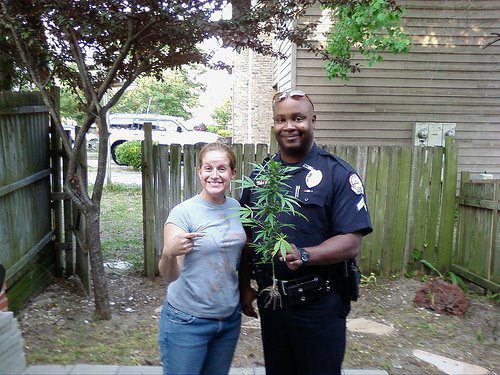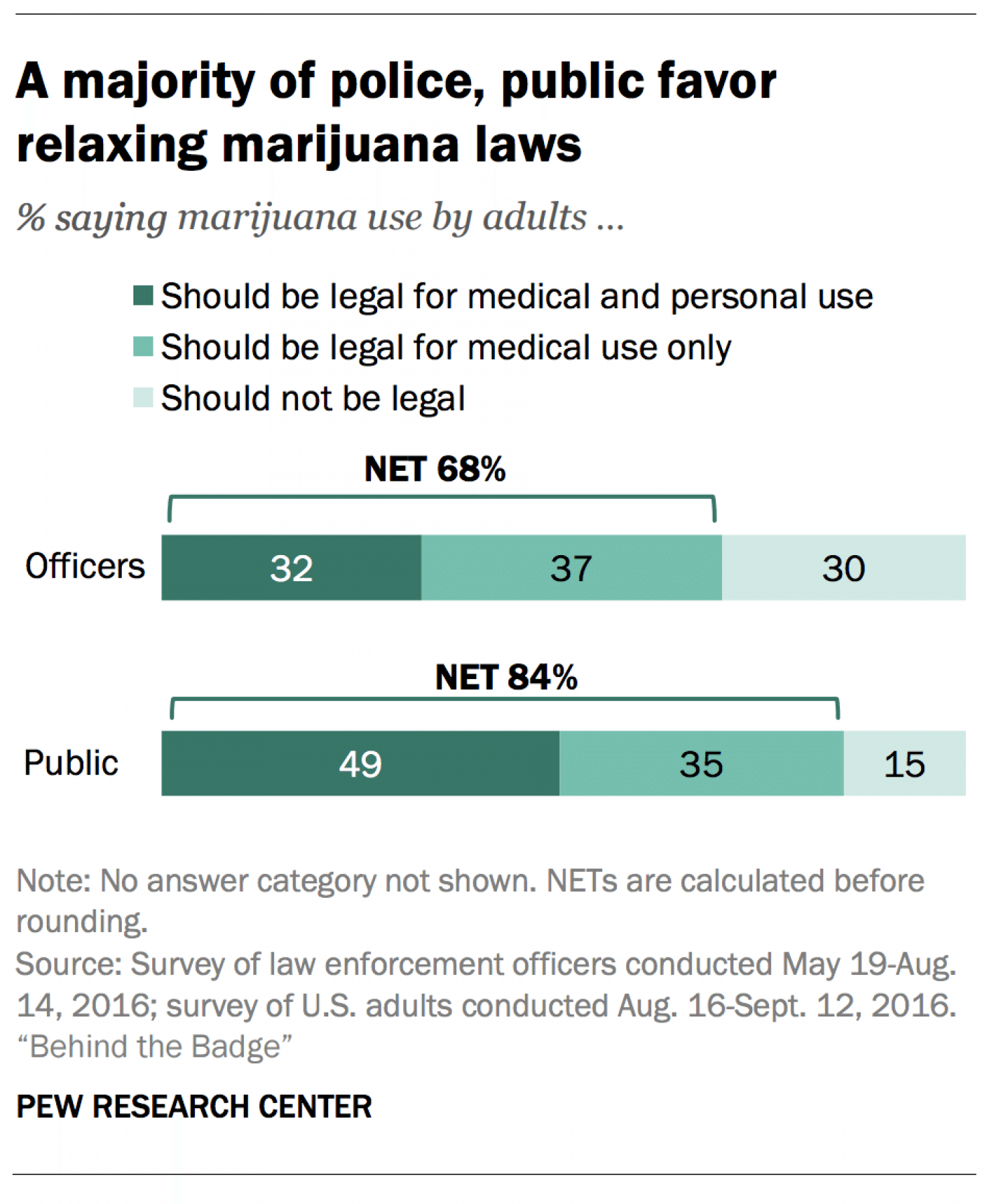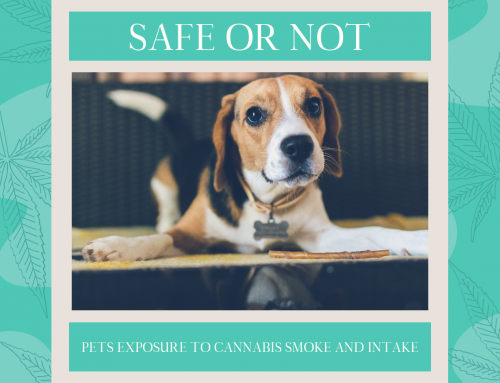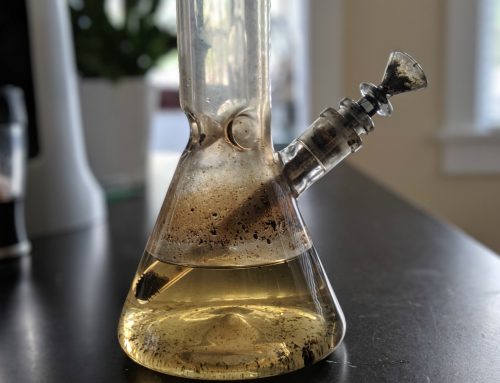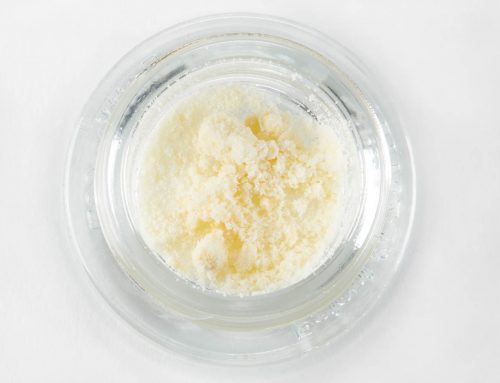You’d be forgiven for thinking that the vast majority of police officers would be against the decriminalisation of cannabis. A number of polls carried out to date have brought to light evidence that semi-legalization of pot has a tendency to place cops in something of an awkward position, wherein they’re stuck between a rock and a hard place when it comes to busting cannabis users. Carrying and using small amounts might be overlooked even where it’s officially against the law, but where to draw the line?
The result is inevitable – certain cops and regions enforcing far heavier restrictions on cannabis users than others. But until a concrete line is drawn, this is the way things are likely to stay.
Which is precisely why the results of one of the largest polls ever conducted on how police officers themselves feel about cannabis policy shouldn’t come as any big surprise. The new Pew poll took into account the opinions of around 8,000 active police officers, in order to find out how many remained in favour of outright cannabis prohibition.
In total, 32% of those polled stated that they would support the legalization of cannabis for both medicinal and recreational purposes. In addition, 37% stated that they would like to see medical marijuana legalized, with recreational cannabis remaining under strict controls. By contrast, less than a third of those polled indicated that they believe cannabis across the board should remain illegal.
The poll also took into account public opinion – the results once again mirroring those of various other legalization studies carried out over recent months. In this instance, just under 50% of respondents stated that they believe recreational and medical cannabis should be fully legalized. 35% indicated that they would support the legalization of medical pot only, while just 15% said that full prohibition of cannabis would receive their support.
As such, it appears that perhaps for the first time, both cops and consumers are united in their opinions as to how cannabis policy should be controlled going forwards. Nevertheless, it remains highly unlikely that any sweeping reforms will be made at a Federal level in the near future, meaning that the cannabis industry across the wider United States will continue to exist in a somewhat confusing grey area for the foreseeable future.
California’s Colossal Cannabis Trade
As it stands right now, the future of the cannabis industry in California is being carved out by a surprisingly small team of government workers, packed into cubicles and firing through paperwork like there’s no tomorrow. Specifically, this cannabis regulatory task-force based just outside Sacramento has been tasked with an extremely important yet seemingly impossible job – map out state cannabis regulation in its entirety for the legal commercial pot market, ahead of things kicking off on January 1 next year.
Pretty much every decision these guys make will have a massive impact and influence on what happens next. From where, when, how and by whom the stuff can be grown to distribution regulations to quality control and literally everything else besides, the responsibility on their shoulders is nothing short of staggering.
If they get it right, cannabis looks set to benefit from the most spectacular windfall on the back of a legal cannabis industry worth no less than $7 billion. By contrast, get it wrong and the whole industry is likely to be thrown into a state of disarray, which will of course playwright into the hands of the existing cannabis black market – which market authorities are hoping to get rid of, once and for all.
Of course, the other priority for state authorities is the collection of more than $1 billion every year in cannabis tax revenues.
The entire project is being spearheaded by just 11 people, who according to some are facing an impossible task that simply cannot and will not be addressed in full by the Jan 1 deadline. Sen. Mike McGuire, a Northern California Democrat, warned that with the way things stand as they are today, the timescale set out for the new legal cannabis system is entirely unrealistic.
“It’s going to take us 10 years to dig out of the mess we are in,” predicted McGuire.
He was talking about both bringing workable legislation for the legal cannabis industry into effect and ensuring that the spectacularly large and complex black market as it exists right now is driven out of business permanently. In order for the industry to get into high gear, tens of thousands of licenses will need to be issued, a wide variety of environmental factors will need to be taken into account and a fair and agreeable taxation system will need to be introduced. In addition, the state will have to determine exactly how or if medical cannabis cultivation and distribution will be handled in a different way to recreational cannabis.
In total, somewhere in the region of 20 entirely different licenses will need to be introduced, covering everything from initial cultivation to logistics to distribution to testing to retail sales and many more besides.
Jumping the Gun
While a growing number of experts really cannot see a workable regulatory system being put into action by January next year, this hasn’t stopped certain players jumping the gun a little. Along with the cannabis black market and the soon-to-be legal cannabis market, there remains the incredibly lucrative grey market that’s really making the most of the current gap.
Rather than waiting to obtain the required licensing and for the regulatory system to be brought into effect, many medical marijuana dispensaries already up and running are doling out products to recreational customers.
But then again, this isn’t really anything new from the way things happened beforehand, according to some.
“Of course, some dispensaries sold weed to just about anyone long before Prop. 64 passed. But the legalization law seems to have made these shady players even more brazen. A search on Weedmaps.com turned up many shops that now openly state they’ll sell everything from infused gummy candies to concentrated waxes after verifying only the buyer’s age, not his or her medical status,” the Cannifornian reported.
“‘I think that they’ve gotten more emboldened,’ said James Wolak, captain of the Narcotics Bureau for the Los Angeles County Sheriff’s Department. “People feel like now that it’s legal, anything goes. And that’s just not the case.’”
Make no mistake about it though – authorities in California are continuing to impose a heavy-handed approach when it comes to cannabis users flouting the rules. The Federal government has said that anyone contravening regulations which ban the use of cannabis in public places can expect to be busted – regardless of the change in cannabis law at a state level.
“Marijuana – recreational, medical or otherwise – remains prohibited on federal public lands and property, regardless of state laws,” said Andrew Munoz, Pacific West spokesman for the National Park Service.
“So there is no change: We will continue to enforce marijuana prohibition as before.”
According to Fresno defense attorney Mike Mitchell, this is likely to come as a nasty surprise for those who simply make assumptions as to the legality of recreational cannabis, along with those who cannot be bothered abiding by the rules.
“I’d anticipate more people thinking now that it is legal in the park,” he said.
“A lot of people don’t recognize that you are going into a completely different jurisdiction; it’s just like going into a different state. A lot of people don’t know that. They just think they’re going into a park, like any other California park.”

